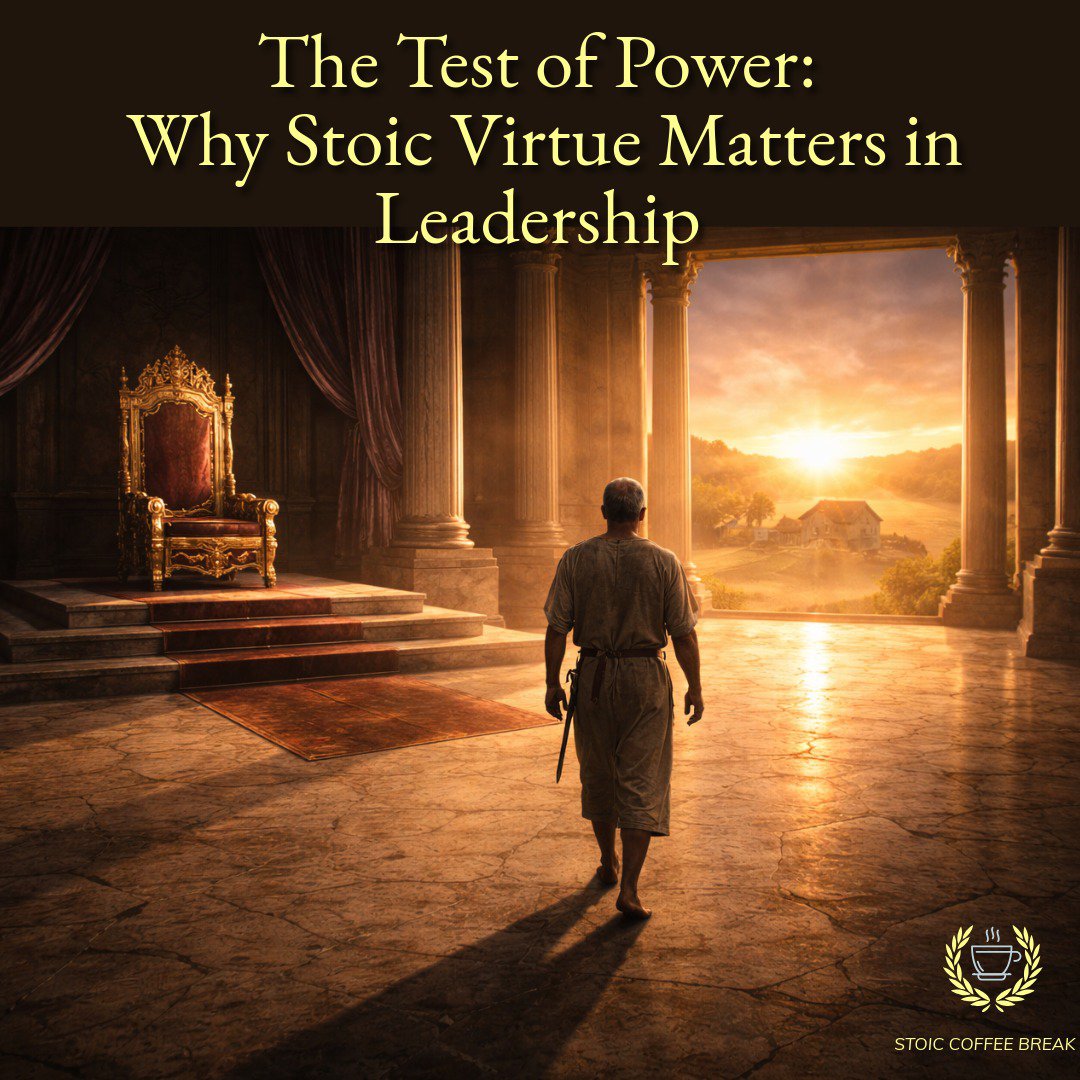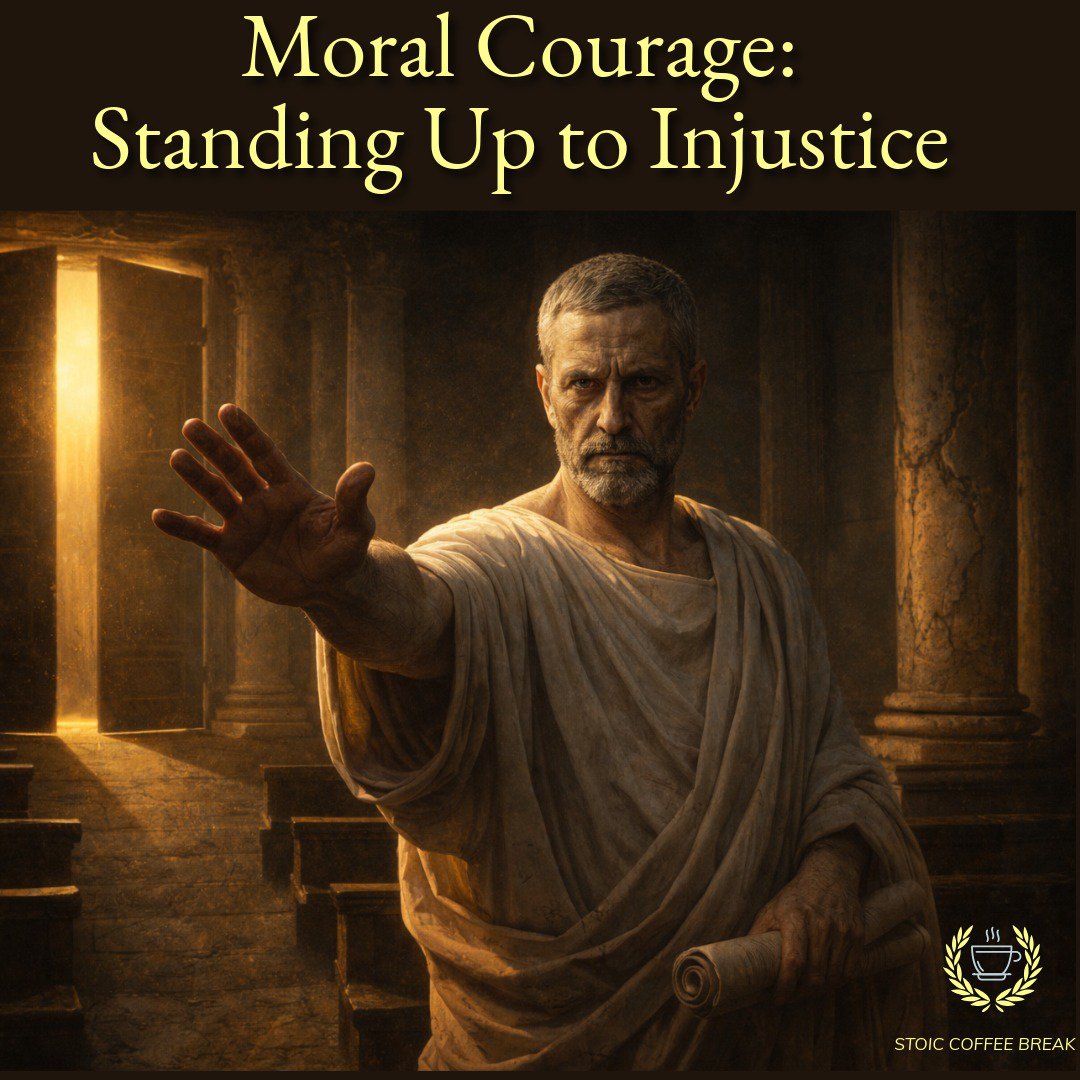
What should you do when somebody criticizes you and you know that they're right? What would Marcus say about social media? These are just two of the questions that I'm going to answer in today's q & a episode.
Hello, friends. My name is Erick Cloward, and welcome to the Stoic Coffee Break. The Stoic Coffee Break is a weekly podcast where I take aspects of stoicism and do my best to break them down to the most important points. I share my thoughts on stoic philosophy as well as my experiences, both my successes and my failures, and hope that you can learn something from them. All within the space of a coffee break.
This week's episode, as I mentioned, is a q & a episode. So from time to time, I like to take questions from my listeners as well as just some random ideas that, you know, I've, I've been considering and put them into questions and do my best to answer them on the fly. So, without giving lots of preparation, just me taking a question and seeing what comes up.
So the first question is, “What should I do when somebody criticizes me and I know they're right?"
Wow, this is a tough one and it's one that I can really relate to because I used to be much more hotheaded. I used to be much more sensitive to when people disagreed with me about things, especially when I felt strongly about them. It was really hard for me to let go of what I felt was the right opinion, even at times when I knew that they, that the opinion that I was holding onto was incorrect.
But it was more important for me to hold my ground than it was to find the error in my thinking. So now moving forward, I try to hold on to what Marcus Aurelius says, which is that, “If anybody can prove me wrong and show me my mistake in any thought or action, I shall gladly change. I seek the truth which never harmed anyone, and the harm is to persist in one's own self-deception and ignorance.” Meaning it's more harmful for us to remain in ignorance and error than it is to just admit that we're wrong about something. Because when you can't admit that you're wrong, then again you're sitting in wrongness and you're also being willfully stubborn about wanting to stay in that wrongness.
And when we do that, it can cause a lot of problems. This was something that was a big problem in my last relationship. I would oftentimes know that I was wrong about something and I. Rather than admit my error and my mistake and and what I had said or done, I would oftentimes distract from the argument and pick out something that my partner had said incorrectly or had said in a way that was meaner or harsher. And then I would attack that rather than step up and just own my own error.
And, even before that, there was a situation where it cost me something that was really important to me. I was in a rock band and back in about 2008, 2009, and uh, we were working on a song and the lead guitarist who wasn't uh, a trained musician was one of the main songwriters, and he was, he was a great guy, and he was talking about how he was counting in this part of the song, which had kind of a weird timing at the beginning. And me being a trained musician, or at least partially trained musician, I felt like I knew better and was instructing them on how to count in properly. And so we got in this big argument and it was all about which was the correct way to count the song and properly.
And the thing was, is that there was a point where I understood where he was coming from and I could see that the way that he wanted to count in was actually easier for him to do. And it was something that I could have adapted to, but I wanted so badly to be proven right, and to show how smart I was. I held onto that and I can look back at that big argument that we had, and we argued for about 30 minutes about this, that that was kind of the ending of my time with the band because shortly thereafter they said we should take a break, and then they reformed and went on to do their own thing and.
For me it was, it was, it was hard because I really enjoyed what we were doing. I liked the songs we were writing. I love playing music and, and singing and that's what we were doing. But my unwillingness to step up and own my mistake or at least be willing to adapt to somebody and, you know, dig my heels in that way has caused me a lot of problems in this world.
So I really try my best to take time and energy to look at it. Doesn't matter if I'm right or if I am wrong, you know, I should just go ahead and own up to it when I make a mistake and then just continue… then move on from that quickly rather than spending all this, this time and energy denying that I'm wrong or that I'm, you know, not willing to own up to the mistakes that I make.
Okay, question number two. “How do I know if I'm actually making progress in my personal growth or just spinning my wheels?”
Yeah. This is a good question and this is something that everybody kind of has to figure out is what is your metric for knowing if you're, if you are making progress in this world?
And for me, what has really helped is that I. I look at my life and the progress that I've made, and it comes down to a few key factors is am I happier, or at the very least, am I dealing with stress and anxiety in a way that is helping me to move past them and not sit in that? Um, am I in more or less arguments with the people that I care about? Am I willing to, like, like the first question, am I willing to admit when I'm wrong?
And it's really about understanding what it is that you want and if you want to have a more peaceful life, if you want to think more clearly, if you want to be happier. I think those are all really good metrics. And again, they're subjective, so it's, it's kind of hard to to know.
So there's a great quote from Seneca that I really like, which explains, uh, kind of the importance of philosophy as well as how you can. Kind of notice when it's actually having impact on your life. And it says, “Philosophy is not tricks before an audience, nor is it a thing set up for display. It consists not in words, but in actions. One does not take it up just to have an amusing pastime remedy for boredom. It molds and shapes the mind, gives order to life and discipline to action shows what to do and what not to do. It sits at the helm and steers a course for us who are tossed in waves of uncertainty. Without it, there is no life that is not full of care and anxiety for countless things happen every hour that need advice, philosophy alone can give.”
Now it really comes down to what kind of, you know, things you're trying to overcome in your life. So are you less hotheaded? Are you less angry? Are you finding that you are happier in life? Are you finding that you're a bit more peaceful in life? Are you able to have a conversation with somebody that before might have been much more heated? When somebody disagrees with your opinion, can you listen to their opinion and give it some weight and some time to listen to it to make sure that you truly understand it before responding?
I think there are many things that are outward manifestations of taking this philosophy and implementing it into your life. So it really comes down to the areas of your life that you were trying to make progress in. So for me, one of the biggest things that when I first stumbled onto Stoicism was that I wanted to get to where I wasn't so emotionally reactive, uh, to things that that bothered me. And I can say that I'm honestly much less reactive than I used to be.
I also wanted to be able to have more control over what the Buddhists call the “monkey mind”. That when my thoughts were bouncing all over the place, that I could kind of calm things down, slow things down, and be able to take some time and to think more clearly and more logically and more rationally. And those are all things that I think that I've gotten a lot better at through studying this philosophy.
So I think it really comes down to what you want, and if you're making progress on those things every single day. And it doesn't have to be a huge amount of progress. It just has to be enough to where you might be able to notice the difference even in a few days or a few weeks, or even a few years.
But more than anything, know that philosophy is an ongoing art. You never reach the end station. You never reach a point where you know everything and are wise about everything. You're always a work in progress and that's great and that's the way that life should be. Always a work in progress.
Alright, next question. “What do you think Marcus Aurelius would say about social media?”
Wow, this is, uh, this is a good one. So I've been listening to quite a few different podcasts over the last few weeks. One of my favorites was, uh, an interview with Jonathan Haidt on, uh, Ezra Klein's podcast. And they're talking about the, the problem that social media has on young people and the damage that it's done, and even on older people. I know for me that social media has been a real challenge, uh, especially when I get distressed about things. I, uh, I will often use that as a distraction.
But one of the things that I want to bring up here is a quote from, uh, Marcus Aurelius, where he talks about that he said, “Or is it your reputation that is bothering you? But look at how soon we're all forgotten. The abyss of endless time that swallows it all. The emptiness of those applauding hands. Those people who praise us, how capricious they are, how arbitrary and the tiny region it takes place, the whole earth, a point in space and most of it uninhabited.”
So right there, Marcus Aurelius just points out that we worry so much about our reputation and that. You know, when we really look back on it through the fullness of time, there are empty hands clapping and how capricious they are and how arbitrary. And so when we focus on our reputation, it's a waste of time and energy. I. And that it really doesn't matter. And social media is very much about, about reputation.
And I know it's hard because I, I struggle with this because I don't necessarily like social media, but I post on social media because I want to get my message out. And I know that plenty of people have found me because of my posts on social media. So I think that it's a good tool, but like any tool, it can also, while it can be useful for building, it can also damage. So I really think it's about recognizing social media as a tool for connection and using it sparingly in the right way for connection and to find the things that can bring value into your life.
But it should also be seen for exactly what it is, which is just a lot of strangers that you will probably never, ever meet watching you post stuff on, uh, an ephemeral thing that in a hundred years will. Most of this stuff will disappear or be unknown, or people really won't care that much about it. So I think having a healthy relationship with social media is probably the best way to go about it.
And if you can live without social media, you're probably better off, just to be honest, because it gives such a distorted view of the way that the world really is and getting more likes, more views. All of these types of things are in the long run, really just. Empty and don't really bring the type of joy, happiness, satisfaction that you really are trying to get in your life.
Okay, last question. “What's one way I secretly avoid discomfort, even though I talk about embracing it?”
This one actually is kind of a follow up to the previous question about social media, and one thing that I've found lately that I've struggled with is doom scrolling. Getting stuck on social media for an hour or two, just scrolling along and getting that dopamine hit. I used to be a lot better about being able to, you know, regulate that I would limit myself to 20 minutes in a day.
And lately it's gotten worse and so it's, it's, for me, it's something that I wanna work on. I want to change, uh, for a number of reasons. One, because it's just a waste of time. It doesn't bring anything and particularly fantastic back into my life. And number two, it makes it harder for me to stay focused on the things that I'm trying to get done. And I used to be much better about being able to stay highly focused for hours at a time. I could sit down and read a book. And sit down and two or three hours would pass without, without even thinking about it. Uh, I could sit down and write for several hours at a time and not even thinking about it, and now I'm finding that I'm getting much more distracted.
So I think some of that comes when I have some anxiety about things or I'm nervous about things or I worry about my problems, then I try to distract myself with something that's gonna give me that short term pleasure or, or that dopamine hit. And so that's something I do wanna change and I hope that. You know, if you're listening to this, that that's something that you might consider, you know, dealing with as well. I know that there's talk about it all over the place, but I, and you know, we go, yeah, yeah, yeah….there's, you know, we know we should do it, but oftentimes it's harder to do.
So that's one of the things that I'm going to promise to you, or I guess not promise, but I'm gonna put out there. Uh, in the public sphere, that, that's something that I wanna work on is making sure that I spend less time on social media and doom scrolling, and that I spend more time on creating the things that I want to in my life.
Because the more time I spent creating, the better I feel about myself, the better I feel just about my life in general. The more I have to share with you, the more I'm able to accomplish in my goal of trying to take this philosophy and these ideas and share them with as many people as possible so that they can find that type of calm and happiness and, and create the life that they want rather than being a slave to their emotions or a slave to circumstances. Because for me, that's, that's ultimately what it's about.
And if social media is taking away time from my mission, then that's something that I really need to reconsider and to find better ways of, of dealing when I, I feel that stress and anxiety. So that's me, uh, pulling open the kimono with a little bit of radical candor there. So yeah, that's probably the, it's not my deepest, darkest secret, but it's definitely one that I. I wish that I were better about, and I know that I talk about attention and, and those type of things on here. So that's something that I'm going to be working on, is that when I'm feeling uncomfortable, rather than grabbing my phone, that I work on that discomfort and embrace it rather than trying to ignore it.
And that's the end of this week, Stoic Coffee Break. As always, be kind to yourself, be kind to others, and thanks for listening. Also, just wanna let you know that my book is available for sale right now. You can find it on my website at stoic.coffee. It'll have a links out to all the major booksellers. And while you're there, you can also join my free community. And basically it's, like I said, it's a free community. I am working on some courses that I will be putting up there, which those will be paid, but the community itself is free. So I'd love to have you come and join. Thanks again for listening.
My book Stoicism 101 is available! Order here!
Find out more at https://stoic.coffee
Watch episodes on YouTube!
Find me on linkedIn, instagram, twitter, or threads.
Thanks again for listening!


